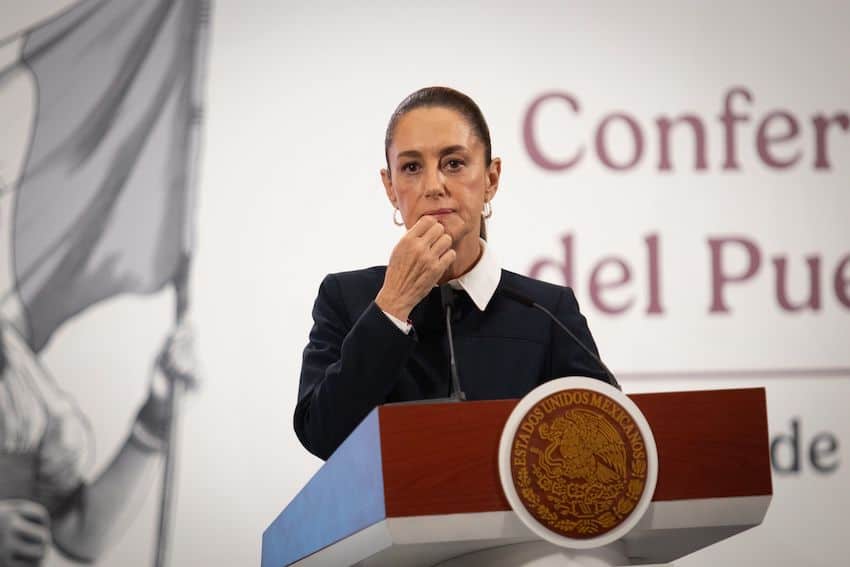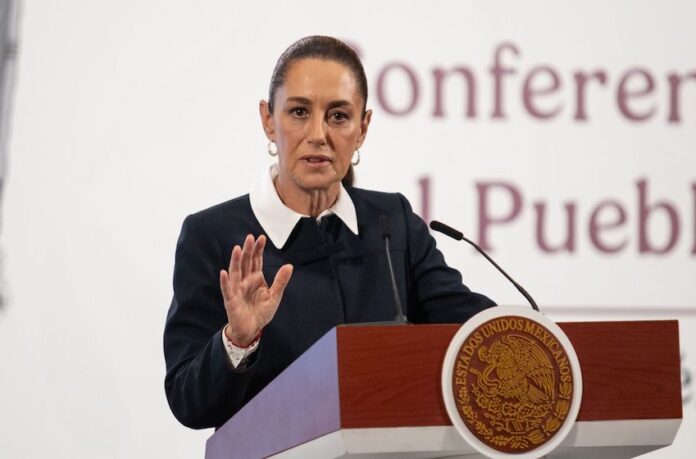The United States’ 50% tariff on imports of steel and aluminum — which took effect today — is “unjust,” “unsustainable” and “has no legal basis,” President Claudia Sheinbaum said Wednesday.
Economy Minister Marcelo Ebrard said Tuesday that Mexico would seek an exclusion from the tariff, which doubles the 25% duty that the United States imposed on steel and aluminum imports in March. If it doesn’t get one, the Mexican government will announce its response next week, Sheinbaum said.
🚨 @POTUS just signed the order raising tariffs on steel and aluminum imports to 50%.
Here is the text of the order:
1. On January 11, 2018, the Secretary of Commerce (Secretary) transmitted to me a report on the Secretary’s investigation into the effect of imports of steel… https://t.co/4uwBVmd4Zj
— Rapid Response 47 (@RapidResponse47) June 3, 2025
U.S. President Donald Trump announced his plan to double the tariff on steel and aluminum imports last Friday.
“We’re going to bring it from 25% to 50% — the tariffs on steel into the United States of America, which will even further secure the steel industry in the United States,” he said at an event in Pennsylvania.
Trump signed an executive order to impose the higher tariff on Tuesday.
“I have determined that it is necessary to increase the previously described steel and aluminum tariffs to adjust the imports of steel and aluminum articles and their derivative articles so that such imports will not threaten to impair the national security,” Trump said in the order.
“In my judgment, the increased tariffs will more effectively counter foreign countries that continue to offload low-priced, excess steel and aluminum in the United States market and thereby undercut the competitiveness of the United States steel and aluminum industries.”
A White House fact sheet said that Trump is “taking action to end unfair trade practices and the global dumping of steel and aluminum.”
“Foreign nations have been flooding the United States market with cheap steel and aluminum, often subsidized by their governments,” the White House said.
Last year, the United States and Mexico announced a series of steps aimed at curbing the circumvention of previous U.S. tariffs on steel and aluminum, particularly targeting products from China shipped through Mexico.
The new 50% tariff, like the 25% one it replaced, was imposed in accordance with Section 232 of the United States Trade Expansion Act, rather than the International Emergency Economic Powers Act (IEEPA), which Trump has used to impose separate duties on most countries from around the world, including Mexico.
Brazilian steel manufacturer Gerdau cancels US $600M investment in Mexico due to tariffs
Mexico is the world’s second-largest exporter of steel, aluminum and products derived from those metals to the United States, according to 2024 data from the U.S. Department of Commerce. The value of those Mexican exports to the U.S. was US $34.83 billion last year, second only to China.
Sheinbaum: ‘It’s a measure we consider unjust’
Sheinbaum responded to the implementation of the higher tariff at her Wednesday morning press conference.
“It’s a measure we consider unjust,” she told reporters.
“It’s a measure for the whole world, not just for Mexico, the tariff is increased for all countries of the world with the exception of Great Britain, which stays at 25%,” Sheinbaum said.
“… In the case of Mexico, firstly, it’s unjust … because as we have said several times, Mexico imports more [from the United States] than it exports in steel and aluminum. Formally, a tariff is imposed when there is a deficit,” she said.
“… Secondly, from our perspective, it has no legal basis because there is a trade agreement,” Sheinbaum said, referring to the United States-Mexico-Canada Agreement, or USMCA.
She noted that the United States imposed the steel and aluminum tariff for national security reasons, before highlighting that “yesterday the White House spokeswoman said there is good collaboration with Mexico in all terms, including on the issue of security.”

“So we don’t think there is a basis” to impose the tariff on imports from Mexico, Sheinbaum said.
She also said that a tariff on Mexican steel and aluminum is “unsustainable because, as is the case with cars,” products containing steel cross the border during the production process.
Sheinbaum noted that she would discuss the issue with representatives of Mexico’s National Chamber of the Steel and Iron Industry on Wednesday, and highlighted that Ebrard would meet with U.S. officials on Friday.
She said that if Mexico fails to reach an agreement with the United States, her government will announce its response — but not an “eye for an eye” one — next week.
“Our responsibility is first to protect the employment of Mexicans, and second [to protect] the steel industry. A 50% tariff represents a very big impact for the steel industry,” Sheinbaum said.
“… We don’t agree [with the tariff], we don’t think it’s just or sustainable because it raises the price of everything. We hope to reach an agreement,” she said.
Ebrard: Steel tariff will have to be adjusted because economic impact will be ‘very big’
Ebrard told reporters on Tuesday that he doesn’t believe the 50% tariff can be sustained long term.
“As has happened with other [U.S.] tariffs, it will have to be adjusted because the economic impact is very big,” he said.
Indeed, Trump has made various changes to tariffs he has announced since returning to the White House in January. By doing so, and much to his chagrin, he gave rise to the acronym TACO — “Trump always chickens out.”
Ebrard described the 50% tariff on Mexican steel and aluminum as “unjust for Mexico because United States has a surplus” on the trade of those metals.
“It doesn’t make sense to impose a tariff on a product on which you have a surplus,” he said, repeating an argument he has made before.
The economy minister said he will formally ask for an exclusion from the tariff when he meets with U.S. officials in Washington D.C. on Friday.
“How do I see this measure? I see it as unjust, unsustainable and inconvenient,” he said.
Ebrard has been attempting to negotiate more favorable trading conditions between Mexico and the United States for months, and has made regular trips to Washington since Trump began his second term.
Before the U.S. tariff on steel and aluminum doubled, he had been attempting to win an exemption from the 25% duty on those metals as well as a U.S. tariff on foreign cars.
It remains to be seen whether Ebrard will be able to get any concessions from the United States government at his meeting on Friday.
In addition to the steel, aluminum and auto tariffs, Mexican goods not covered by the USMCA also face 25% duties when entering the United States.
The United States Court of International Trade last week ruled that Trump had exceeded his authority in using the IEEPA to impose fentanyl trafficking-related duties on non-USMCA compliant goods, but the U.S. government promptly appealed the decision and obtained a stay on the trade court’s ruling.
By Mexico News Daily chief staff writer Peter Davies ([email protected])
